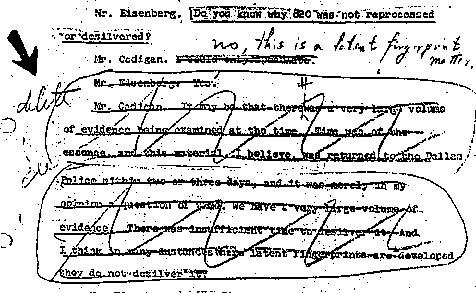
According to the Warren Commission, FBI document specialist James Cadigan answered a question from WC assistant counsel Melvin Eisenberg this way:
Mr. Eisenberg. Do you know why Exhibit No. 820 was not reprocessed or desilvered?
Mr. Cadigan. No, this is a latent fingerprint matter. [WCH7, 418]
But as recently released WC transcripts have shown, this is not at all what Mr. Cadigan said in answer to Eisenberg's question. Here is his real answer:
Mr. Eisenberg: Do you know why 820 was not reprocessed or desilvered?
Mr. Cadigan: I could only speculate.
Mr. Eisenberg: Yes?
Mr. Cardigan: It may be that there was a very large volume of evidence being examined at the time. Time was of the essence, and the material, I believe, was returned to the Dallas Police within two or three days, and it was merely in my opinion a question of time. We have a very large volume of evidence. There was insufficient time to deliver it. And I think in many instances where latent fingerprints are developed they do not deliver it.
[WCD--Cadigan deposition transcript]

This chicanery, and other examples like it, caused WC assistant counsel Leon D. Hubert to write an April 4, 1964 memo to Howard P. Willens, another assistant counsel who, according to the WCR, "acted as liason between the Commission and the Department of Justice. The memo was cc'd to chief counsel J. Lee Rankin.
In his memo, Hubert wrote: "1. At the staff meeting on Friday, I raised objections to 'editing' of the transcripts of depositions; but I did not make one objection which I thought of later and what perhaps is stronger than any else I made."
Later in the memo, Hubert added: "4. With regard to unsigned depositions, the foregoing is also applicable. A waiver of signature certainly does not include permission to alter ['alter' is crossed out and 'change' handwritten in] meaning...."
Why did WC staffers alter Cadigan's testimony and the testimony of so many others? Because they had no choice.
The evidence is clear that Oswald's possessions from the Paine residence and 1026 N. Beckley were SECRETLY sent to the FBI in Washington on the night of November 22-23 1963, returned to Dallas a few days later, and finally OFFICIALLY acquired by the FBI on November 26 and then OFFICIALLY sent to Washington. FBI specialist James Cadigan let the cat out of the bag in his WC testimony.
One researcher who has studied the significance of this secret evidence transfer from Dallas PD to FBI Washington headquarters and back again is John Armstrong. For more information, see the text of his 1997 and 1998 November in Dallas speeches http://enteract.com/~hargrove/armstrong.html.
Here's a brief excerpt from John's NID98 speech:
James Cadigan, an FBI document specialist, received Oswald's possessions in Washington. Cadigan said (SLIDE 2) "Initially the first big batch of evidence was brought in on November 23 and consisted of many, many items. When Cadigan was asked if he recalled one of the items he said "when the vast bulk of this material came in it was photographed. But to remember one item out of four or five hundred, I cannot say I definitely recall seeing this". Cadigan's testimony was revealing. The FBI had secretly obtained "four or five hundred items" of Oswald's possessions on November 23rd--three days before they took over the case. Cadigan's testimony regarding Oswald's possessions in Washington on November 23rd is preserved in his original deposition. (SLIDE 3) But when reprinted in the Warren Volumes, references to November 23rd were deleted. When Jesse Curry began to explain how the FBI took Oswald's possessions to Washington on November 23rd, Allen Dulles adjourned the meeting.
The secret secret transfer of this evidence to Washington and back to Dallas gave the FBI an early opportunity to alter the material evidence relating to Lee Harvey Oswald and to rewrite the truth. FBI document specialist James Cadigan is the same man who could find no marks, scratches, abrasions, or other indications that would tie the brown paper bag that allegedly held "Oswald's" Carcano to the rifle itself.
Cadigan might have made an interesting HSCA witness, but as Jim Marrs has pointed out, he was one of "six top FBI officials all of whom were scheduled to testify before the House Select Committee on Assassinations" but who died within a period of a few months in 1977.
Return to the Minox Article
Return to Home Page